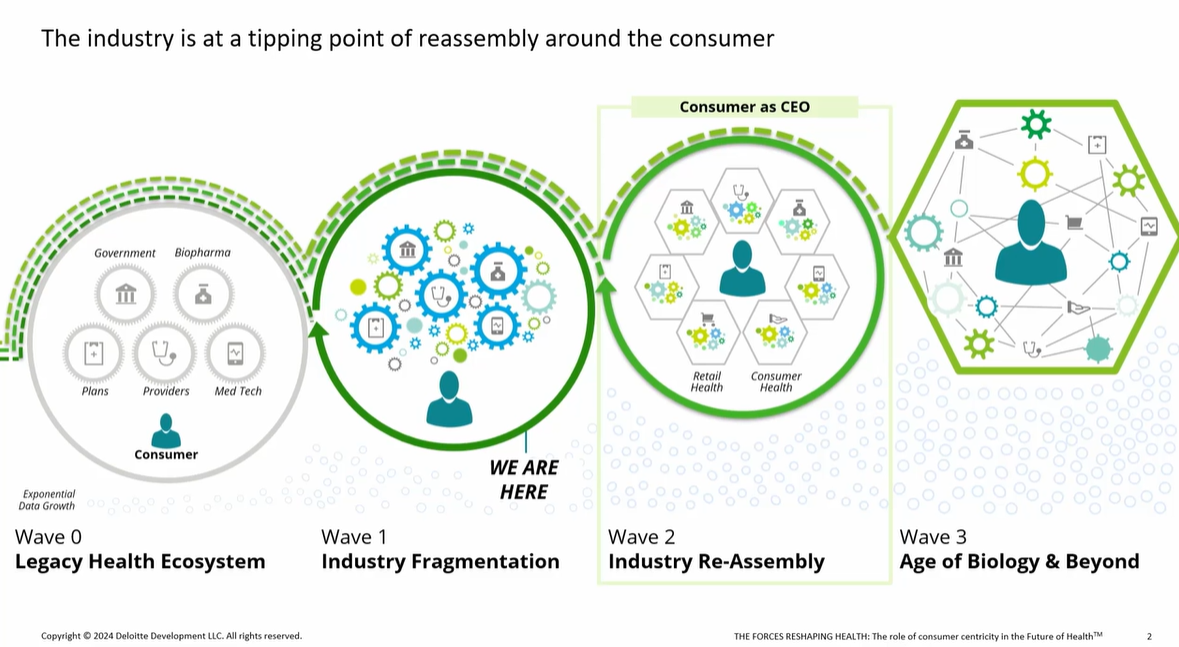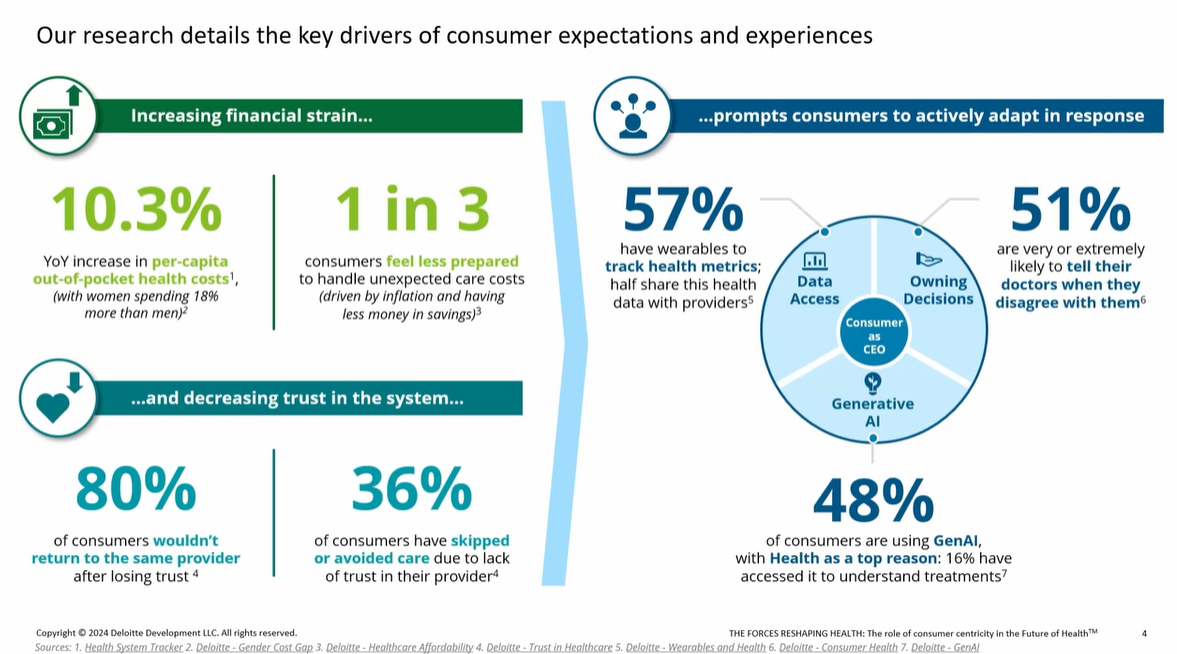This post first appeared in the Constellation Insight newsletter, which features bespoke content weekly and is brought to you by Hitachi Vantara.
The convergence of conferences and healthcare-related themes provided a good overview of the state of healthcare data, AI and disruption.
With CES 2024 featuring a good dose of healthcare and wellness news and JP Morgan 42nd Annual Healthcare conference, there were plenty of items to ponder. Here are vignettes from healthcare disruption front lines.
Healthcare disruption and reassembly ahead
Neil Batra, Deloitte's Global Future of Health Leader, said during a CES 2024 panel that the current health system has been in place for the last 70 years since World War II. He said the health system is comprised of multiple players trying to maximize returns, but the consumer is on the fringes of the overall ecosystem.
"The consumer is the secondary part of the story. What we've observed from other transformations in other industries, is that transformations occur when you have pressure from the outside coming in and incumbent structures have to respond. And that's exactly where we think we are today," he said.
This fragmented market features virtual health challenging brick-and-mortar, novel approaches that threaten existing systems and consumers more in charge of their data, said Batra. These fragmented players reassemble where there's retail health and consumer health.

Batra said:
"We think reassembly is where the magic happens and where the value is going to be created. Incumbents are going to gobble up some of these new movers and create a fundamental transformation of the power structure to sectors that are intertwined, interrelated and integrated with all the great innovation that's occurred in the fragmentation moment. After reassembly we get to this notion of an age of biology on a personalized level. The journey is from being about the rule of thumb to the health of N plus one. We think it's a 20-year journey and we think we're roughly midway through."
Will consumers really leverage their health data?
Batra's vision of healthcare nirvana is one that revolves around the consumer being the CEO of her healthcare. He said:
"The consumer is going to elevate to the CEO of their own health. Armed with information spinning off wearables and other devices and data being translated through AI applications; laymen may be able to understand really complex dynamics. And that moves the healthcare professional from somebody as central figure to one that is now maybe a copilot or a coach."
He said this reformatting of healthcare professional won't happen overnight, but consumers will take charge of wellness, mental health and health overall. Healthcare won't be about sick calls only. Generative AI will result in technology that makes healthcare more consumer-oriented, said Batra.

Dorothy Kilroy, Chief Commercial Officer at Oura, said data quality and ease of use will drive how quickly consumers take charge of their own healthcare. "A lot of people still don't know how to just interpret the data. And so, we're going to have to make sure that it's really user friendly in a way that they can actually action on it," said Kilroy.
Cristian Liu, Director of Partnerships and Go-to-Market Strategy at Google Health said consumers have wearables and data so the tools for healthcare reinvention are there. "Do we have the tools to make sense of this information? I think it's really exciting time because of generative AI and because of artificial intelligence," said Liu.
Much of this health reinvention will depend on enterprise data infrastructure, trust and regulatory issues, said Tom Swanson, Head of Healthcare Strategy and Marketing at Adobe. He added:
"The healthcare industry as a whole has more data than any other industry. The question is, are you using the data in an appropriate way that is actually a value to your consumers? Can you use that data to provide value and build trust to enable your consumers to be a proactive participant in their own wellness? The data is there. Right. But I think the biggest problem that we have as an industry is not using it in a timely manner or being afraid to use it because of legal and regulatory constraints."
Kilroy said it's likely that consumers will push the healthcare industry to transform and clear regulatory hurdles. "I see consumers pushing and demanding for more here," she said.
Dr. Generative AI
Liu said the most interesting part of healthcare reinvention is the data and results interpretation via AI and large language models. "A year ago, we couldn't necessarily throw in all of this data and say what does it means. Today you can throw it all into a large language model and it can predict the pieces understood in really laypersons language and explain to you what's going on. That's so exciting for consumer applications," said Liu.
Kilroy said consumers will look to generative AI as a healthcare partner in phases. "There is certainly a more health-conscious consumer that is being more proactive about their health. I don't think that's everybody yet," said Kilroy. "I do think that is changing, but we still have a long way to go in more literacy of health to the consumer."
Data and generative AI can bridge the gap between what a person is feeling and knowing what's going on inside of the body. "The best data is your own data compared to your average personally, and then see how those little micro experimentations can actually change your life," said Kilroy.
The ability to combine personal data with generative AI interpretation may ultimately depend on data interoperability, said Liu. Consumers have health data. Healthcare systems have data locked up. Sharing is difficult. Incentives to share data, in the form of lower healthcare costs, may knock down barriers.
Data sharing between patients and physicians would also be a boon to the customer experience, argued Kilroy. "I think giving physicians continuous data gives them a bigger superpower. I am more hopeful that working with them than against them is actually going to be what's valuable here," she said.
Nvidia only tech company at JP Morgan's 42nd Annual Healthcare conference
Nvidia's healthcare reach played out on two fronts. First, the company held a special address during CES 2024 and outlined plans to use its Nvidia BioNeMo platform to meld generative AI models, cloud and drug discovery. BioNeMo is a generative AI platform to provide services to develop, customize and deploy foundational models for drug discovery.
In addition, Nvidia said Amgen will build AI models to train on human datasets on its infrastructure. The system is based on Nvidia DGX SuperPOD. Amgen will install the system at its deCode genetics headquarters in Reykjavik, Iceland.
With the CES 2024 news out of the way, Kimberly Powell, Vice President of Healthcare, spoke at the JPMorgan 42nd Annual Healthcare conference.
Powell said accelerated computing and AI are combining to usher in an era of digital biology. Nvidia systems are being used for cell imaging and high dimensional analysis. She added that spatial genomics was another promising area.
"There's another phenomenon that is happening, not only the digitization of biology but also with generative AI, the ability to represent the two things that describe drugs, biology and chemistry in a computer. We can use generative AI to represent it," she said.
Powell likened the shift in biology to computer-aided design and electronic design automation in the chip industry. It's early, but Powell argued that drug discovery will be a huge market, just like chip design and semiconductors.
However, there's still work to do. Powell said:
"Biology and chemistry generative AI models are still quite small. We're still in the very, very early innings compared to other fields like natural language processing and what you're seeing with GPT-3, 4, 5, but we're growing in size and complexity. And so, we still have a lot of progress to be had building larger and more capable models from digital biology data that already exist today and the continuously -- enhancing these models with the data that’s continuously being generated in the labs. So BioNeMo provides the biopharma ecosystem with large scale model training to effortlessly train and scale AI training to thousands of GPUs and you can train billion parameter models in days rather than the months it was taking."
Medtronic eyes AI for growth
Medtronic has formed an AI center of excellence as the company aims to advance AI-enabled healthcare based on data from its medical devices.
Speaking at the JPMorgan 42nd Annual Healthcare conference, Medtronic CEO Geoffrey Martha outlined the company's plans in AI. Martha said the company's move to create an AI center of excellence is aimed at centralizing key data assets including millions of patient datasets, regulatory experience, analytics knowhow, and medical device expertise.
In a nutshell, many of Medtronic's devices today include algorithms and models. The Medtronic AI-enhanced portfolio includes GI Genius, which uses AI for endoscopy, Touch Surgery Enterprise, AiBLE for neurosurgery, MiniMed 780G System for diabetes management, and LINQ, an insertable cardiac monitor.
"We have the data and analytics expertise, and we're continuing to build on that. And this is across multiple disease areas. And we've been working very closely with the regulators on this. We spend a lot of time with regulators around the world, especially the FDA on how to think about AI and health care," said Martha, who added the company is planning to leverage common platforms to scale.
Martha added that's it's early, but Medtronic is already seeing the promise in training models with its data.
"This isn't about ChatGPT. I mean we have to train the models ourselves with a lot of high-quality data, but the impact is amazing here. And I think as we move forward, you're going to hear more and more about this from us," said Martha.
From our underwriter
Each year over 22,685 people are admitted to St Mary’s Hospital — a National Health Service (NHS) hospital run by the Isle of Wight NHS Trust. Many of these patients need specialist scans, biopsies and other clinical tests as part of their treatment. The Isle of Wight NHS Trust set out to build a state-of-the-art imaging suite for its pathology department and chose the Hitachi Virtual Storage Platform (VSP) E590 platform as its foundation. Get the full story.


